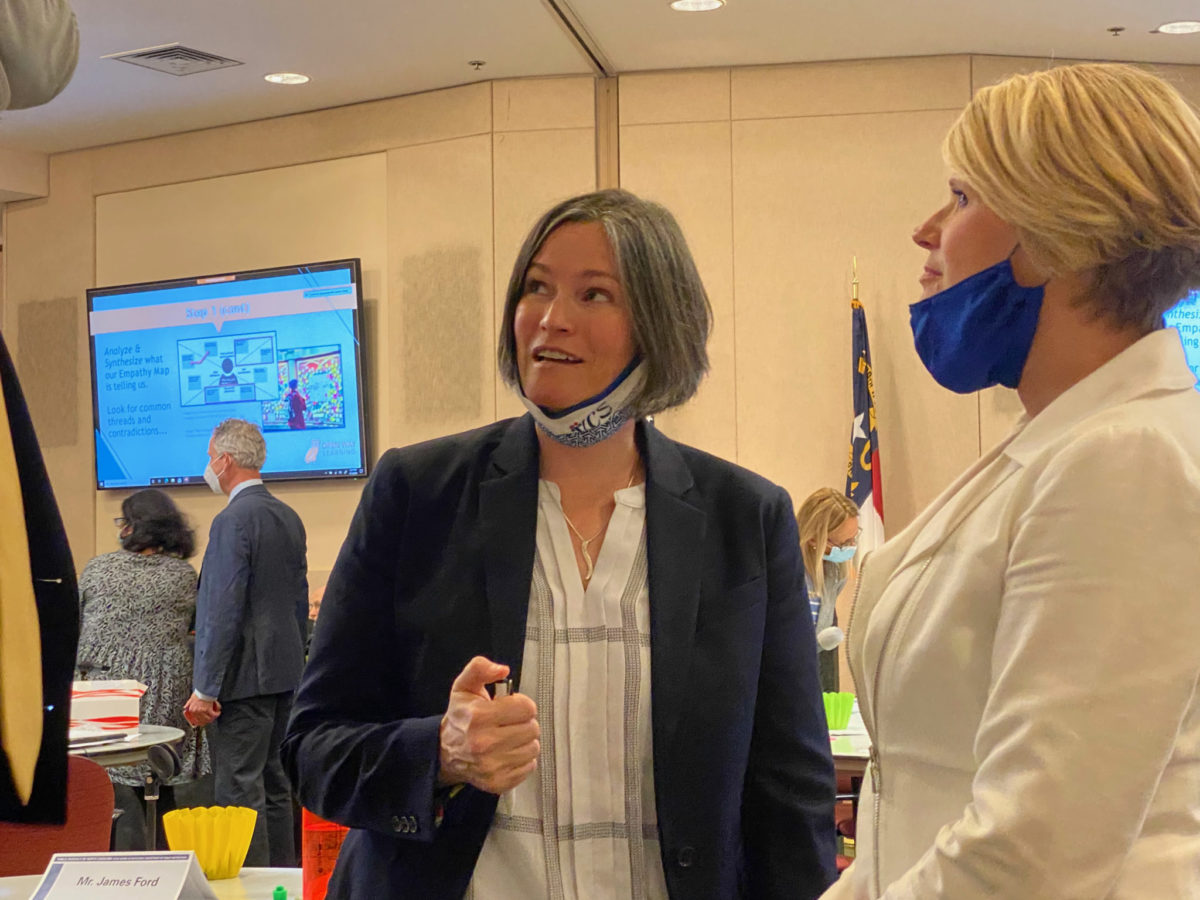

This week is a study in contrasts. The State Board of Education held its annual planning session, where much of the talk touched on or was influenced by the Board’s strategic plan, which revolves around equity. At the same time, the General Assembly took up a bill that critics worry will stifle the ability of schools to honestly talk about the historical inequities that drive the need for that very plan.
On Tuesday, the state superintendent of public instruction tweeted her support for the bill not long after a national education leader told the Board that their strategic plan and equity resolution was a national model.
And on Wednesday, during the House debate on that bill, primary bill sponsor Rep. John Torbett, R-Gaston, said that the bill wouldn’t change what history can be taught in schools. Meanwhile, Democrats who spoke against it said it would do just that, with one representative comparing it to book burning.
You would be forgiven for thinking the state’s leaders are having two entirely different conversations.
Here is what happened this week:
House Bill 324
On Tuesday, the House rolled out a bill that Republicans say will prevent discrimination in schools.
It has the short title, “Ensuring Dignity & Nondiscrimination/Schools,” and it tells schools they cannot “promote the following concepts:”
- “One race or sex is inherently superior to another race or sex.
- “An individual, solely by virtue of his or her race or sex, is inherently racist, sexist, or oppressive, whether consciously or unconsciously.
- “An individual should be discriminated against or receive adverse treatment solely or partly because of his or her race or sex.
- “An individual’s moral character is necessarily determined by his or her race or sex.
- “An individual, solely by virtue of his or her race or sex, bears responsibility for actions committed in the past by other members of the same race or sex.
- “Any individual, solely by virtue of his or her race or sex, should feel discomfort, guilt, anguish, or any other form of psychological distress.
- “That the belief that the United States is a meritocracy is an inherently racist or sexist belief, or that the United States was created by members of a particular race or sex for the purpose of oppressing members of another race or sex.”
The bill has it’s own particular definitions of “promote,” including:
- “Compelling students, teachers, administrators, or other school employees to affirm or profess belief in” the concepts listed above.
- Including those concepts “in curricula, reading lists, seminars, workshops, trainings, or other educational or professional settings in a manner that could reasonably give rise to the appearance of official sponsorship, approval, or endorsement.”
- Or “contracting with, hiring, or otherwise engaging speakers, consultants, diversity trainers, and other persons for the purpose of advocating” these concepts.
The bill states that nothing in it should be “construed as prohibiting … speech protected by the First Amendment of the U.S. Constitution.”
During the debate on the House floor, Rep. Ashton Clemmons, D-Guilford, herself an educator, said that when she taught first grade and was talking about presidential history, a student asked her why there were no women or Black people who had been president. This was during the presidency of George W. Bush. Clemmons said she’s worried that this bill would prevent her from answering that question.
“This bill bothers me as an educator to my core,” she said.
Rep. James Gailliard, D-Nash, continued his opposition to the bill on the floor. He was the lone lawmaker who spoke against it during the House education committee the day before. He asked how schools can teach that this country wasn’t founded on oppression when, he said, 12 million slaves were brought to the country between 1450 and 1850.
“This bill is a give-me-the-microphone-back bill, because we want to talk but we don’t want to listen to anyone else,” he said.
Rep. Charles Graham, D-Robeson, a member of the Lumbee Tribe, recounted when he went to talk to a group of elementary students in 1983 and was asked if he lived in a teepee. He said that many people used to be taught that America’s native people were savages.
“We’re trying to circumvent history is what we’re trying to do here,” he said.
Torbett closed the discussion on the bill by saying that he hoped everyone had listened respectfully to the criticism offered. He then had the last word, reiterating a point he led with when introducing the bill to the chamber.
“To be clear, explicitly clear, this bill does not change in any way what history can and cannot be taught,” he said. “What it does, it tells our children what we honestly owe them … and what we owe them is that education system that unites, not divides.”
State Board of Education
While the bill was being heard in the House K-12 committee on Tuesday, the State Board of Education was holding the first day of its annual planning meeting.
Early that day, Robert Hull, president and CEO of the National Association of State Boards of Education, was praising the Board for its equity resolution and strategic plan, which you can find here.
That plan includes priorities such as increasing “the number of culturally-relevant, equity-focused resources for educators.”
The equity resolution was passed by the Board in September 2020, though three Republican-appointed members of the Board voted against it. State Superintendent Catherine Truitt hadn’t yet been elected.
The resolution says a number of things, including that the Board embraces equity, resolves to eliminate equity barriers and opportunity gaps, will use its power to provide “equitable opportunities” for all students, will make sure curriculum reflects students, and supports districts in changing offensive schools names.
The resolution also says that the Board will change policies “through an equity lens and commit to work with the Superintendent and the Department of Public Instruction to create and maintain an equity officer to ensure consistency and continuity with this essential guiding principle inside and outside the agency.”
Here is the resolution in its entirety:
The State Board’s planning session was scheduled to break for lunch at 1:30 p.m. on Tuesday. Close to that time, House Speaker Tim Moore, R-Cleveland, put out a press release on the bill. In it was a quote in support from Truitt. She later tweeted out that quote.
That’s all she said about the bill from her state superintendent Twitter account. But later, on her candidate page, she talked about helping craft the bill.
At least 10 other states introduced bills in the last two months with language similar to HB 324, including Idaho, Iowa, Louisiana, Missouri, New Hampshire, Oklahoma, Rhode Island, Texas, Arkansas, and West Virginia. Most of these bills, including North Carolina’s, contain language similar to former President Donald Trump’s now-rescinded Executive Order from September 2020. That order included a definition for “divisive concepts” as concepts expressing:
“(1) one race or sex is inherently superior to another race or sex; (2) the United States is fundamentally racist or sexist; (3) an individual, by virtue of his or her race or sex, is inherently racist, sexist, or oppressive, whether consciously or unconsciously; (4) an individual should be discriminated against or receive adverse treatment solely or partly because of his or her race or sex; (5) members of one race or sex cannot and should not attempt to treat others without respect to race or sex; (6) an individual’s moral character is necessarily determined by his or her race or sex; (7) an individual, by virtue of his or her race or sex, bears responsibility for actions committed in the past by other members of the same race or sex; (8) any individual should feel discomfort, guilt, anguish, or any other form of psychological distress on account of his or her race or sex; or (9) meritocracy or traits such as a hard work ethic are racist or sexist, or were created by a particular race to oppress another race.”
What Truitt said
Prior to the State Board’s regular meeting on Thursday, EducationNC talked with Truitt and asked her to elaborate further on her thoughts on the bill.
When asked how she reconciles the equity focus of the strategic plan and comments she has made in support of equity with her support of the bill, she said:
“To me, equity means giving every single student what they need at the time that they need it. Equity doesn’t mean restoration. It doesn’t mean fair. It means giving all students what they need at the moment they need it. And there is nothing that I can see in the language of that bill that prevents us from providing equity to all students.”
When asked if she understood why people were opposed to the bill, she said:
“What I think people are concerned about are the intentions behind the bill, whether real or imagined. And what I say is that when I look at a bill I only have the language that’s in front of me. And so I’m evaluating that bill not based on real or imagined intentions. I’m basing what I see in the language, and the language of that bill says that I cannot give preferential treatment to any one person based on their gender or — I believe it says sex — or race.”
She then added the following:
“The bill, which is not likely to be signed by the governor, does not prohibit us from continuing our work in the office of equity. It does not prohibit us from meeting the needs of all students. It does not prohibit us from advocating for funding where we need it. It does not prohibit ensuring we have instructional equity for all children.”
When asked if she was concerned that parents or students would perceive the bill as preventing the truth from being taught in schools, she said:
“Again, I don’t see anything in this bill that prohibits the truth being taught, and what I would say is that I’ve gotten so many letters, emails, over the past couple of months from parents of biracial children who have begged me to stand up against critical race theory, which goes against the very notions of individual freedom of belief.”
Moore also brought up critical race theory in his press release on the bill, but the bill doesn’t mention critical race theory, and it’s not clear that the contents of the bill have anything to do with the theory. A recent CNN article quoted Kimberlé Crenshaw as describing it this way:
“Critical race theory is a practice. It’s an approach to grappling with a history of White supremacy that rejects the belief that what’s in the past is in the past, and that the laws and systems that grow from that past are detached from it.”
According to the article, Crenshaw is a founding critical race theorist and a law professor who teaches at UCLA and Columbia University.
The big vision
On Wednesday, the day that HB324 passed the full House 66-48 with no Democrats supporting the bill and no Republicans opposing it, the State Board of Education heard from a pair of district education leaders who talked about their use of data to understand inequities occurring in their schools. That included things like the disproportionate punishment of Black students and the over-identification of Black children as having cognitive impairments.
In response, Bev Emory, executive director of Leandro support at the state Department of Public Instruction, said: “Unless we’re able to talk about that, we can’t fix it.”
Earlier in the day, Anthony Jackson, superintendent of Vance County Schools, talked about how he helped transform his district. He talked about the importance of vision, calling out the Board’s strategic plan in particular.
“You’ve got to have enough courage to stand on the big vision. If the strategic plan is the big vision, understand you’re going to get big pushback,” he said.
Later in the meeting, he said: “If you have no vision, there’s no opposition. You just go along.”
The Board recently passed new social studies standards, which were the focus of a lot of opposition from Republicans on the Board and sparked increased scrutiny of how the State Board is thinking about and addressing equity. Much of the debate focused on the use of words such as “racism,” “discrimination,” and “identity.” The standards didn’t garner Republican Board member support even though those words had been changed from what was originally in the draft standard: the terms “systemic discrimination,” “systemic racism,” and “gender identity.” While Truitt does not have a vote on the Board, she was involved in revising a previous version of the standards to simplify those terms to their final version.
Rep. John Autry, D-Mecklenburg, said during the floor debate on the bill that he believed the bill was a reaction to the Board’s passage of the social studies standards.
A return to the Board room
Thursday was the first time the Board met in its normal room on the seventh floor of the education building in downtown Raleigh with some staff allowed in the audience. Since last March, due to COVID-19, meetings have either been remote or, more recently, included just a skeleton crew of some Board members and a few staff.
New on the wall was this sign:


To close out the planning session, today, Abdur-Raqib Ibn Gant, a student at Edgecombe Early College, spoke. He talked about the fact that his father tried to murder his mother when Gant was young. He described a corporation coming in and taking the land where his mobile home sat. He talked about being homeless. And he talked about finding a home at Edgecombe Early College, where he is the only Black male in his graduating class. He also talked about being a role model for the other Black students at the school coming up behind him.
Here is the video of him speaking in full:
Truitt spoke after Gant finished speaking.
“It would be very easy for me to say to you that I’m sorry that you had to go through what you’ve been through in your life. And by that I mean the responsibilities that have been placed on you. As a mother, it breaks my heart that you have had to have that kind of pressure on you at the tender age that you are and were when you were even younger.
“But my friend, you and your lived experiences have made you the person that you are, and while I wish it hadn’t been that way for you, you are going to be a light for the world now, which in and of itself is an enormous responsibility, but God has given you the strength that you need to be the person that you are, the person that you were, and the person that you’re going to be. And that’s amazing, and so are you,” she said.
Today, Truitt also tweeted her support for federal legislation related to critical race theory.




